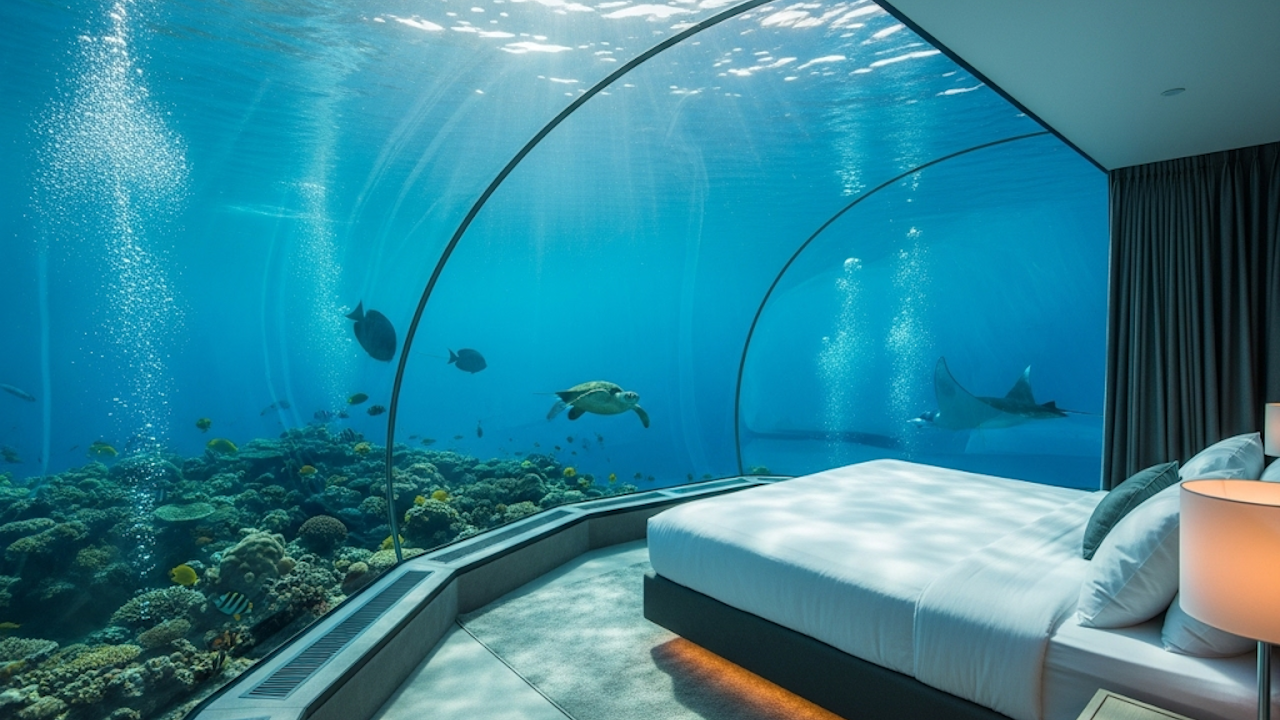For centuries, humans have been fascinated by the ocean. Its vastness, mystery, and beauty have inspired explorers, artists, and dreamers alike. In recent decades, advances in engineering and architecture have made it possible to bring that fascination to life in ways that were once unimaginable. One of the most extraordinary innovations is the concept of underwater hotels. These remarkable structures allow guests to sleep, dine, and relax while surrounded by the shimmering marine world, offering an experience that blends luxury with a sense of adventure.
The Concept and Its Appeal
Underwater hotels are designed to immerse visitors in the marine environment, providing unobstructed views of coral reefs, schools of fish, and sometimes even larger sea creatures like sharks and rays. The appeal lies in the combination of novelty and exclusivity. Guests can feel as though they are part of an entirely different world while still enjoying the comfort and security of high-end hospitality.
For many travelers, the idea of waking up to a view of clownfish darting among anemones or drifting off to sleep while watching the slow, hypnotic movement of the tide is irresistible. It is a kind of travel experience that combines the romance of the ocean with the thrill of being somewhere very few people have ever been.
Notable Underwater Hotels
Several underwater hotels around the world have captured the public’s imagination. One of the most famous is The Muraka at the Conrad Maldives Rangali Island. This two-level villa features an underwater bedroom encased in acrylic, giving guests a panoramic view of the Indian Ocean. Above the surface, the villa offers a sun deck, infinity pool, and other luxury amenities. Below, the bedroom feels like a private aquarium, yet it is entirely safe and climate-controlled.
Another well-known location is Atlantis, The Palm in Dubai, which offers underwater suites with floor-to-ceiling windows that look into a massive aquarium. Guests can see more than 65,000 marine animals gliding by in a carefully maintained habitat. In Zanzibar, Manta Resort’s Underwater Room floats in the ocean with its bedroom located below the surface, offering a secluded escape in clear blue waters.
While many of these accommodations are in tropical destinations, there are also projects in development in other parts of the world, including concepts for underwater hotels in Europe and Asia that would provide different kinds of marine scenery.
Engineering Challenges
Building underwater hotels is no small feat. Architects and engineers must overcome numerous challenges, including water pressure, corrosion from saltwater, and ensuring the structure’s stability. The materials used must be strong, waterproof, and resistant to the harsh marine environment. Acrylic is often chosen for windows and walls because it offers strength and clarity, allowing guests to enjoy clear views without distortion.
Safety is another key consideration. Underwater structures need reliable air filtration, temperature control, and emergency systems. There must also be careful attention to how the structure interacts with the surrounding ecosystem to prevent damage to fragile marine life.
Environmental Considerations
As beautiful as these hotels can be, they exist in delicate environments. The construction and operation of underwater accommodations have the potential to disrupt coral reefs and marine habitats. Responsible developers work closely with environmental experts to minimize impact. Some hotels participate in reef restoration projects or marine conservation programs, using their visibility to promote sustainable practices and educate guests about the importance of ocean preservation.
By operating with sustainability in mind, underwater hotels can be more than just tourist attractions. They can serve as platforms for marine research, offering unique opportunities for scientists to observe and study ocean life without the need for constant diving.
Guest Experience
Staying in an underwater hotel is unlike any other travel experience. The sense of immersion in the underwater world is both calming and exhilarating. Guests often report that the quiet hum of the water and the slow drift of marine creatures create a meditative atmosphere. Meals can be served in underwater dining rooms, and some hotels even arrange for divers to swim past the windows for guests’ entertainment.
Activities vary depending on the location. Many offer snorkeling, scuba diving, or guided marine tours. Others provide spa treatments and private excursions to nearby islands. The exclusivity of these hotels means that service is often personalized, with staff catering to each guest’s preferences.
The Future of Underwater Hotels
With advances in technology, underwater hotels are likely to become more common, although they will probably remain a luxury experience for the foreseeable future. As designers refine methods for building safely and sustainably beneath the surface, it may become possible to offer more affordable underwater accommodations in a wider range of destinations.
Some architects are exploring modular designs that could be transported and assembled on-site, reducing the environmental footprint. Others envision structures that could be relocated as needed to avoid seasonal weather patterns or to allow ecosystems to recover.
In the long term, the innovations behind underwater hotels may even contribute to other marine-based projects, such as floating cities or research stations. These advancements could help humanity adapt to rising sea levels and other environmental challenges.
A Unique Blend of Luxury and Nature
Underwater hotels offer something rare in modern travel. They provide a direct connection to the natural world without sacrificing comfort or style. For travelers seeking new ways to explore the planet, they represent a dream come true, turning the fantasy of living beneath the waves into a reality.
While the experience is currently limited to those with the means to afford it, its influence on travel, architecture, and marine awareness is significant. By inspiring awe and curiosity about the ocean, underwater hotels encourage a deeper appreciation for the planet’s most mysterious and vital ecosystems.
In the end, sleeping beneath the waves is not just about luxury. It is about perspective. Guests leave with a greater sense of how small we are in the grand scheme of nature, and how important it is to protect the world beneath the surface for future generations.


